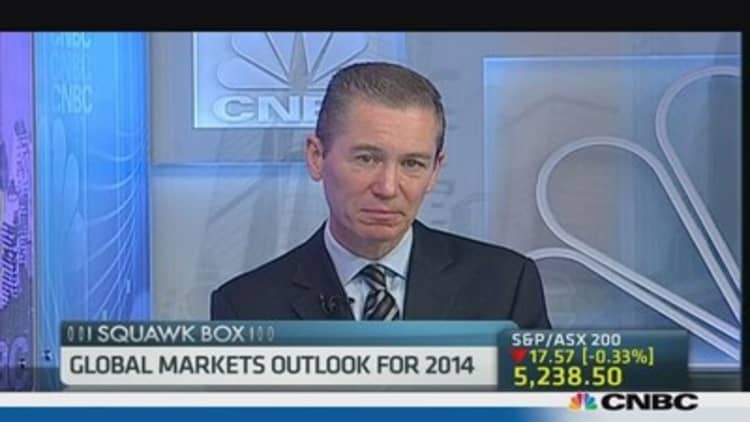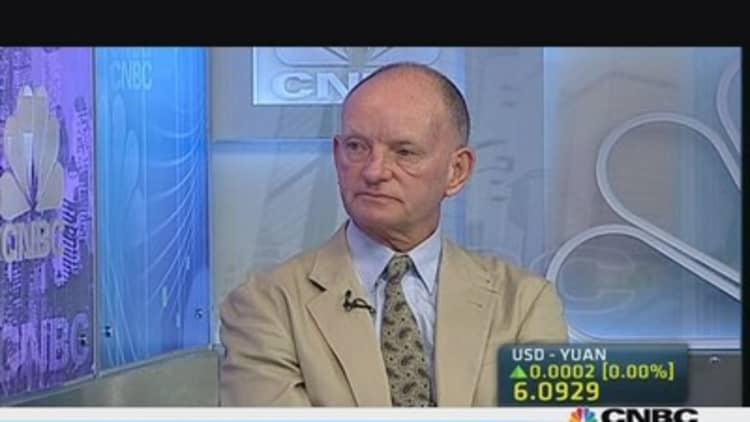
As the Nikkei powered to a six-year high this week, HSBC's chief global equity strategist told CNBC why he's not buying into Japan's 'economic miracle.'
The radical plan that Japanese policy makers pursued to haul Japan's beleaguered economy out of an over decade-long period of inflation this year through massive monetary easing, fiscal stimulus and structural reform, has captured the imagination of investors worldwide.
(Read more: BOJ talk spices up Japan markets)
'Abenomics,' as the policies are known, has helped power Japanese stocks rise around 50 percent this year, double the S&P 500's 25 percent year-to-date gain, while the Japanese yen has simultaneously weakened 18 percent.
But Garry Evans, chief global equity strategist at HSBC, told CNBC Asia's Squawk Box on Wednesday that the fact that so many investors were bullish on Japan was the main reason why he was steering clear.
"I seem to be the last person or the only person in the world who is underweight Japan. I've been all around the world meeting investors and I'm literally yet to find a single person who agrees with my underweight," said Evans. "And that's part of the reason why I'm underweight. If everyone likes a market, who's the next person to step in and buy it? Because everyone has already bought it," he added.
(Read more: Japan economic package to total $182 billion)
Although Prime Minister Shinzo Abe's ambitious plans to revitalize the economy seem to be gaining traction, dragging the economy out of recession and starting to generate a pickup in inflation, Evans said he found it difficult to see where the next positive catalyst was going to come from.
The main driver of both yen weakness and the stock market rally has been the massive stimulus package announced by the central bank in April, he said, noting he doesn't believe any further action will be taken anytime soon.
(Read more: Goldman most upbeat on Japan, Europe stocks in 2014)
"The problem as I see it is that they [the Bank of Japan] let off all of this policy ammunition in April, so why would they do anymore... I think markets need that drip, drip, drip of new information," he said, adding that he was also doubtful over whether policy makers' were committed to pushing through the third arrow of the Abenomics plan - structural reform.
"The third arrow of Abenomics, this structural reform...is just not happening," he said.

The HSBC strategist also voiced concerned about whether current growth momentum in the Japanese economy could be sustained, and said the planned consumption tax hike in April was a worrying risk.
"When they raise the consumption tax in April the question really is just how much the economy slows? We think it goes from 2.6 percent this year to 0.6 percent next year. So what's the next positive thing that's going to take Japan to the next step? We can't see it," he added.
(Read more: Can Japan kiss deflation goodbye?)
HSBC forecasts much lower returns for the Nikkei next year at around 5 percent. He also sees the yen strengthening back to around the 94 to the dollar level by the end of 2014.
Other high-profile commentators also told CNBC they were concerned about Japan's economic outlook.
"The bottom line is that we are relatively optimistic, but you also need to be cautious. There is the reality of the changes, the market perception and the reaction of the environment," said Bertrand Badre, chief financial officer at the World Bank.
The yen traded at 102.57 to the dollar in early trade in Asia on Wednesday.
— By CNBC's Katie Holliday: Follow her on Twitter @hollidaykatie


